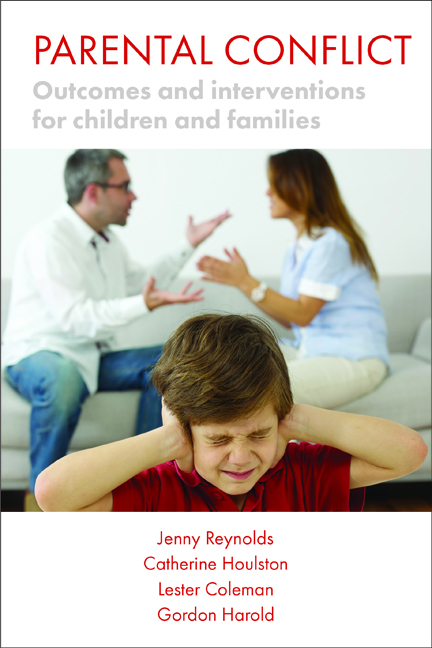Book contents
- Frontmatter
- Contents
- Foreword
- Preface
- 1 Conflict in context
- 2 Understanding different types of conflict
- 3 The impact of inter-parental conflict on children
- 4 How does inter-parental conflict affect children?
- 5 Risk and resilience: why are some children affected more than others?
- 6 Review of conflict-based interventions for couples
- 7 Implications for practice: How to help families
- 8 Conclusions and recommendations
- References
- Index
6 - Review of conflict-based interventions for couples
Published online by Cambridge University Press: 04 February 2022
- Frontmatter
- Contents
- Foreword
- Preface
- 1 Conflict in context
- 2 Understanding different types of conflict
- 3 The impact of inter-parental conflict on children
- 4 How does inter-parental conflict affect children?
- 5 Risk and resilience: why are some children affected more than others?
- 6 Review of conflict-based interventions for couples
- 7 Implications for practice: How to help families
- 8 Conclusions and recommendations
- References
- Index
Summary
The previous chapters have examined the links between inter-parental conflict and children's adjustment. This evidence suggests that conflict between parents can have a negative impact on children's social, emotional and behavioural development. Understanding more about what elements of conflict are important and the factors which put children at risk of experiencing harmful effects are useful in considering how best to minimise the impact of destructive conflict behaviours on children, as well as exploring ways to prevent these patterns of behaviour from developing in the first place (Cummings and Davies, 2010).
This chapter explores the growing evidence base from various couple or family interventions which have covered areas relating to conflict. It outlines the impact these have on parental, child, and relationship wellbeing.
What should conflict interventions focus on?
Evidence suggests that it is not the presence of conflict per se which relates to child outcomes; it is the type of conflict behaviour demonstrated and the duration and intensity of the conflict which are important (Cummings and Davies, 2010). This indicates that focus in intervention programmes should be placed on raising parents’ awareness of the effect of conflict on children and helping parents to develop the skills required to reduce destructive conflict.
Chapter 4 showed that inter-parental conflict can have an indirect effect on child wellbeing by affecting parenting and the parent–child relationship (Schoppe-Sullivan et al., 2007). Therefore, interventions may limit this potential ‘spillover’ effect, by promoting effective parenting skills. A more direct way in which children are influenced by inter-parental conflict is through their own interpretations and understanding of the conflict (Harold et al., 2007). Interventions which help children and young people to understand and cope with their feelings following interparental conflict may also be useful.
Chapter 5 identified various risk and protective (or resilience) factors which have been related to child responses to conflict (Cummings and Davies, 2010). These findings are useful in helping to target interventions at families who may be experiencing difficulties and where children could be at risk of future adjustment problems. The findings also help to highlight protective factors which can be promoted through interventions.
The extensive literature on inter-parental conflict does provide ideas for interventions in this area. However, a review of the wider family and couple intervention literature is needed to help explore the practical implications of how to effectively help families experiencing such conflict.
- Type
- Chapter
- Information
- Parental ConflictOutcomes and Interventions for Children and Families, pp. 77 - 104Publisher: Bristol University PressPrint publication year: 2014

